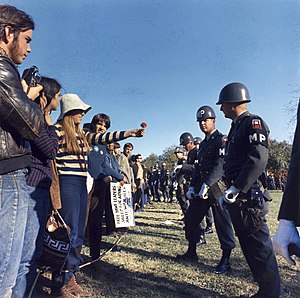
Back معارضة تدخل الولايات المتحدة في حرب فيتنام Arabic Опозиция в САЩ към войната във Виетнам Bulgarian Protestoj kontraŭ milito en Vjetnamio Esperanto Protestas contra la guerra de Vietnam Spanish Vietnamin sodan vastaiset protestit Yhdysvalloissa Finnish Opposition à la guerre du Viêt Nam French Penentangan terhadap keterlibatan pemerintah Amerika Serikat dalam Perang Vietnam ID Opposizione alla guerra del Vietnam Italian მოძრაობა ვიეტნამის ომში აშშ-ის მონაწილეობის წინააღმდეგ Georgian Protesty przeciwko wojnie wietnamskiej w Stanach Zjednoczonych Polish
This article may require copy editing for grammar, style, cohesion, tone, or spelling. (May 2024) |
| Opposition to United States involvement in the Vietnam War | |
|---|---|
 The March on the Pentagon on October 21, 1967 | |
| Date | 28 January 1965 – 29 March 1973 |
| Caused by | American involvement in Vietnam |
| Goals |
|
| Resulted in |
|
Opposition to United States involvement in the Vietnam War began with demonstrations in 1965 against the escalating role of the United States in the Vietnam War and grew into a broad social movement over the ensuing several years. This movement informed and helped shape the vigorous and polarizing debate, primarily in the United States, during the second half of the 1960s and early 1970s on how to end the Vietnam War.
Many in the peace movement within the United States were children, mothers, or anti-establishment youth. Opposition grew with participation by the African American civil rights and second-wave feminist movements, Chicano Movements, and sectors of organized labor. Additional involvement came from many other groups, including educators, clergy, academics, journalists, lawyers, physicians such as Benjamin Spock, and military veterans.
Their actions consisted mainly of peaceful, nonviolent events; few events were deliberately provocative and violent. In some cases, police used violent tactics against peaceful demonstrators. By 1967, according to Gallup polls, an increasing majority of Americans considered military involvement in Vietnam to be a mistake, echoed decades later by the then-head of American war planning, former Secretary of Defense Robert McNamara.[1]
U.S. military involvement in Vietnam began in 1950 with the support of French Indochina against communist Chinese forces. Both military involvement and opposition escalated after the Congressional authorization of the Gulf of Tonkin resolution in August 1964, with U.S. ground troops first arriving in Vietnam on March 8, 1965. Richard Nixon was elected President of the United States in 1968 on the platform of ending the Vietnam War and the draft. Nixon began the drawdown of U.S. troop presence in April 1969. Protests spiked after the announcement in April 1970 of the expansion of the war into Cambodia. The Pentagon Papers were published in June 1971. The last draftees reported in late 1972, and the last U.S. combat troops withdrew from Vietnam in March 1973.
- ^ "Robert S. McNamara, Architect of a Futile War, Dies at 93". The New York Times. July 7, 2009.
© MMXXIII Rich X Search. We shall prevail. All rights reserved. Rich X Search